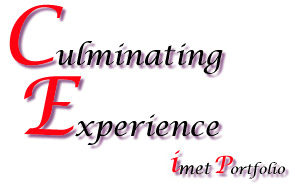

Sharan Merriam (1998) explains qualitative research studies and literature reviews in this way . Once your research focus is established, look for the theoretical framework that will work for you. This is "the structure, the scaffolding, the frame of your study" (p. 45). Since you are all educators and/or staff developers teaching various subjects and strategies from kindergarten to adults, think of your theoretical framework as your "disciplinary orientation." Consider the concepts you teach. The problems you perceive while you are at work are seen through the lens of your theoretical framework. Your theoretical framework can be seen within the larger context of your study through your literature review as you identify key ideas or themes that you wish to address.
Merriam claims that this theoretical framework can lead you to your problem which will, in turn, lead you to your purpose (p. 47). A specific example will help here. Let's say you're teaching eighth grade social studies. You perceive that your students don't relate to the adopted text, yet the text contains some powerful ideas you know your students need to understand. Better yet, you want your students to be more analytical in their thinking and evaluation of the concepts contained in your social studies curriculum and set out in the text. Being a technology-oriented educator, you decide that group work through a WebQuest may help your students construct the knowledge they need in a meaningful, interactive setting. So, your theoretical framework for your study is social studies instruction at the eighth grade level. It is refined by your focus on students constructing knowledge (Lev Vygotsky) and making meaningful connections (David Ausubel). Further, your framework will be even more focused as you look at studies involving collaborative activities of middle school students working in the area of inquiry.
Using the above example, you should be able to see how the theoretical framework allows the teacher-researcher to start with a broad outlook that narrows as key terms are drawn out. The key terms are themes that you want to explore to create the flow of your literature review. Looking at journals for the teaching of social studies would be a good place to start for the hypothetical teacher-researcher in the example. How is social studies taught? How is it effectively taught? What studies show evidence of effective social studies methods? Others have been there before you, so you need to read their views. Narrowing things down, you can ask more specific questions. Are there studies about constructivist methods in social studies teaching? What is meant by "meaningful learning" and are there studies that show middle school students involved in "meaningful learning" or inquiry-based learning activities? What about collaboration? Does it fit here? What do the critics say? Do eighth graders who participate in WebQuests through collaborative activities interact more favorably to the concepts in the social studies curriculum? Now, you can see that we've narrowed down to a real area of focus that's worth studying.
In the discussion above, you can see that we've gone from a broad perspective to a narrow focus. We have done this by looking at key words and themes. Notice that we've only made a passing reference to technology? Well, the use of the WebQuest is part of the strategy. It's the technological tool that connects collaboration with the delivery of instruction. Work with it. We also haven't looked back at thinking skills and problem solving. Are those areas necessary in your treatment of the discussion in your review? You get to decide.
You make decisions based on your theoretical framework. You are the one who decides what to incorporate in your review, but you must present a balanced view. Merriam affirms this in saying "Previous literature can also be drawn upon to make the case that the present study is necessary, urgent, and important to undertake" (p. 51). Not only that, you are also the one who decides when you're done! Merriam says that you'll know when you "...recognize that you have covered all of the relevant literature in the area..." and that "...you know the literature" [emphasis in the original] (p. 54).
One last thought from Merriam, "Regardless of the organization, a crucial component of any literature review is the critical assessment of the research and literature included. The reader wants to know what you think of the literature, its strengths as well as its weaknesses, whether or not it constitutes a major breakthrough in the thinking on the topic, what it adds to the knowledge base..." (p. 55).
Merriam, S. (1998). Qualitative research and case study applications in education. San Francisco: Jossey-Bass Inc.